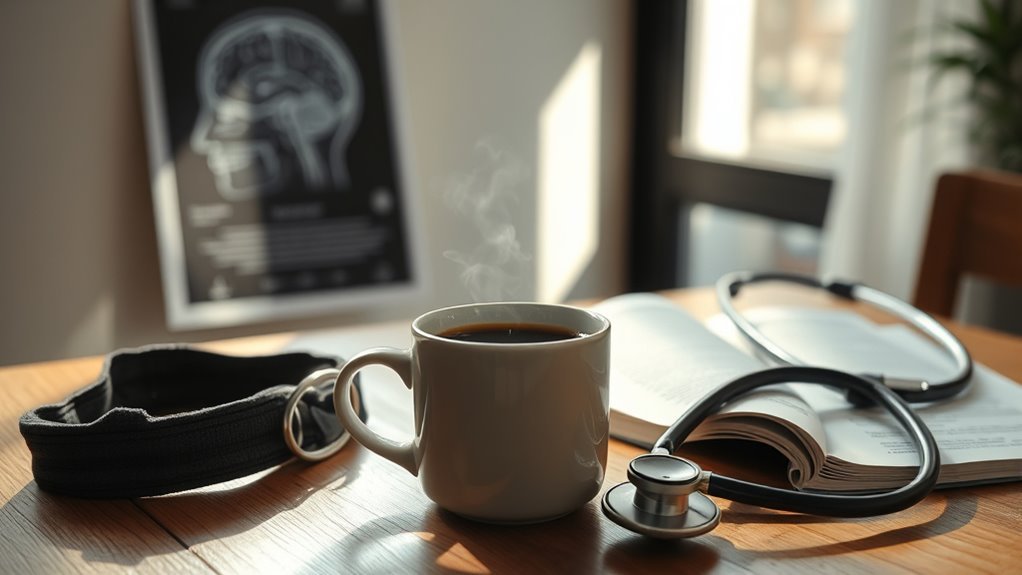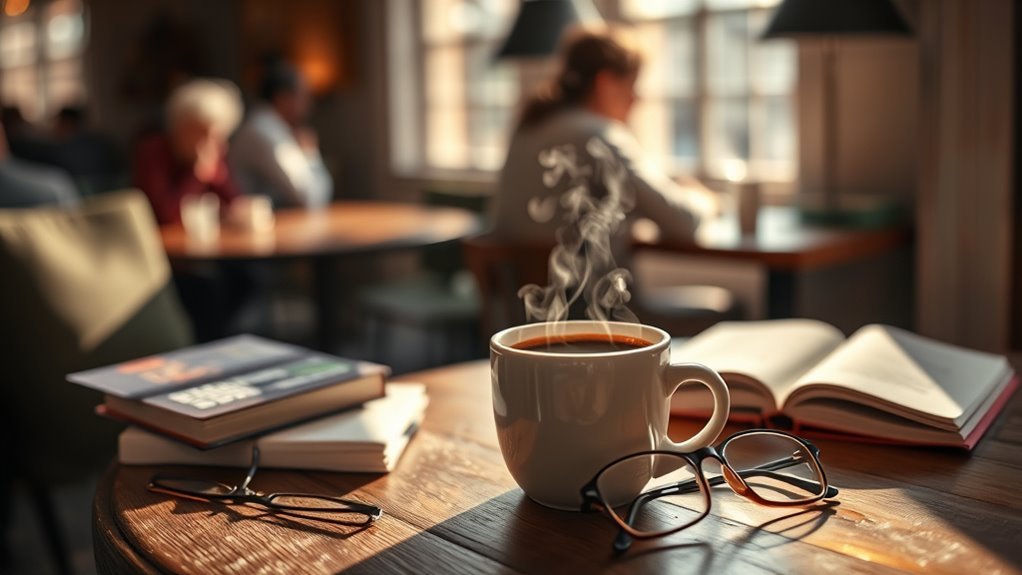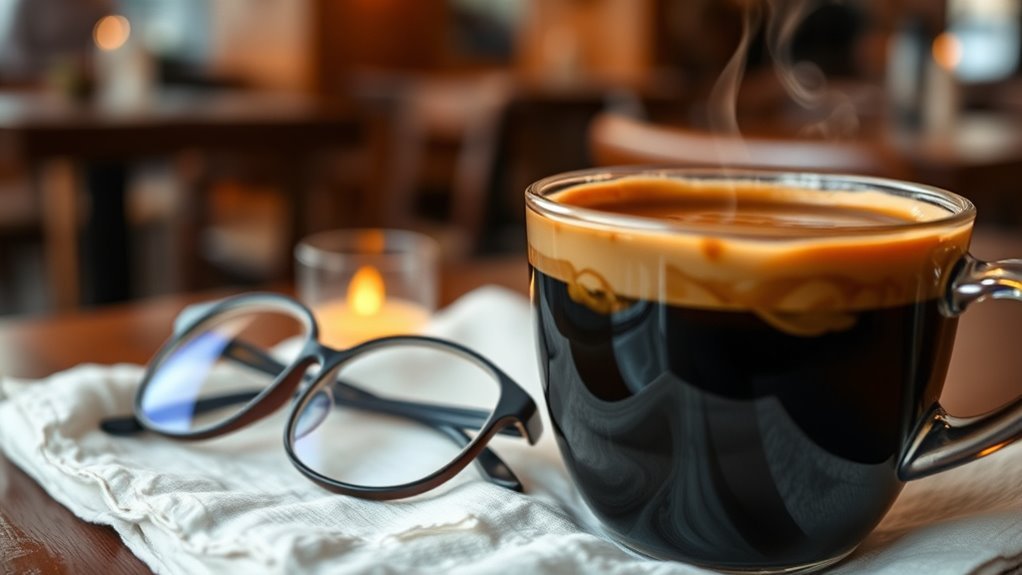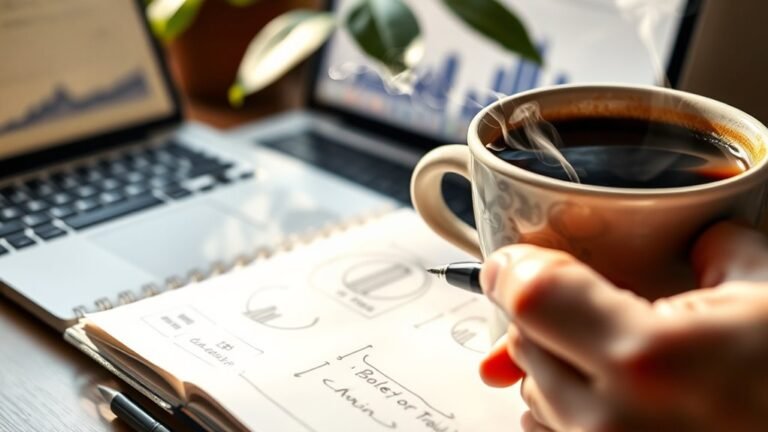Can You Drink Coffee With a Concussion
Drinking coffee with a concussion can be tricky. Caffeine may help improve alertness and cognitive function for some, but it can also worsen symptoms like headaches and insomnia for others. It’s essential to start with small amounts and monitor how your body reacts. Staying hydrated and considering alternatives can be beneficial, too. There are important tips for safe caffeine consumption during recovery, and continuing on will provide you with more helpful insights.
Understanding Concussions and Their Symptoms

When you experience a concussion, it’s vital to understand its symptoms to guarantee proper care and recovery. Concussion awareness is significant, as recognizing signs like headaches, dizziness, confusion, and sensitivity to light can help you take immediate action. These symptoms may not appear right away, so keep monitoring yourself for any changes. Effective symptom management involves resting both physically and mentally, avoiding screens, and gradually returning to activities as advised by a healthcare professional. It’s important to communicate openly about your symptoms to make sure they’re addressed adequately. Remember, ignoring symptoms can lead to prolonged recovery, so prioritize your health and well-being. Stay informed and proactive; knowing what to look for is a powerful step toward recovery.
The Role of Caffeine in the Brain
Caffeine plays a significant role in brain function, particularly in how it affects alertness and mood. When you consume caffeine, it blocks adenosine, a neurotransmitter that promotes sleep and relaxation. This leads to increased dopamine production, enhancing your mood and cognitive function. You might notice improved focus and reduced fatigue, which are common caffeine effects. However, while caffeine can be beneficial for alertness, it can also contribute to anxiety and nervousness in some individuals. It’s essential to contemplate these effects on your overall brain function, especially if you’re recovering from a concussion. Striking a balance with your caffeine intake can support mental clarity while being mindful of how it impacts your well-being.
Research on Caffeine Consumption Post-Concussion

Research on caffeine consumption following a concussion reveals mixed findings. While some studies suggest that caffeine might support cognitive function and enhance recovery due to its effects on caffeine metabolism, others warn that it could exacerbate symptoms like headaches or anxiety.
Consider these points:
- Caffeine’s role in improving alertness can be beneficial for cognitive tasks.
- Individual responses to caffeine after a concussion can vary greatly.
- High doses may lead to dehydration, impacting recovery.
- Monitoring your symptoms is essential when reintroducing caffeine.
Ultimately, if you’re considering caffeine during concussion recovery, it’s best to consult healthcare professionals to tailor advice specific to your needs.
Personal Experiences: Coffee and Recovery
While many people report varying experiences with coffee during their concussion recovery, it’s important to understand how your body might react. Some individuals share personal anecdotes about how a small amount of coffee helped them feel more alert and less fatigued, aiding their healing process. Others, however, found that caffeine exacerbated headaches or disrupted their sleep, leading to a slower recovery. Listening to your body is significant; what works for one person may not work for another. It’s crucial to monitor your symptoms and adjust your caffeine intake accordingly. As you navigate your recovery journey, consider keeping a journal to track how coffee affects your condition, allowing you to make informed choices that support your healing process.
Tips for Safe Caffeine Consumption After a Concussion

When managing caffeine consumption after a concussion, it’s essential to approach it with caution. To guarantee your safety and support recovery, consider these tips:
- Limit caffeine intake: Start with small amounts to gauge your body’s response.
- Explore caffeine alternatives: Herbal teas or decaffeinated options can provide warmth without the jitters.
- Prioritize hydration importance: Drink plenty of water to stay hydrated, as dehydration can worsen symptoms.
- Listen to your body: If you feel any adverse effects, it’s best to reduce or eliminate caffeine.
Frequently Asked Questions
Can Coffee Worsen Headache Symptoms After a Concussion?
When considering if coffee can worsen headache symptoms, it’s essential to think about headache triggers and your caffeine sensitivity. For some people, caffeine can lead to increased tension or exacerbate existing headaches. If you’ve noticed that coffee tends to trigger discomfort, it might be wise to limit or avoid it, especially during recovery. Always listen to your body and consult a healthcare professional if you’re unsure about your symptoms and caffeine intake.
Is Decaffeinated Coffee Safe to Drink Post-Concussion?
Decaffeinated coffee can be a safer choice post-concussion, as it offers some benefits without the caffeine jitters that might exacerbate symptoms. It’s important to listen to your body; if you’re feeling better, a cup might be enjoyable. However, you could also explore coffee alternatives like herbal teas or warm broths, which can provide comfort without risking headaches. Always prioritize hydration and consult your healthcare provider for personalized advice.
How Long Should I Wait to Drink Coffee After a Concussion?
Imagine your brain throwing a tantrum like a toddler denied dessert. After a concussion, waiting at least 24-48 hours before indulging in coffee is wise. Your brain’s on a recovery mission, and caffeine sensitivity can crank up headaches or jitters. While the allure of caffeine’s magic is tempting, patience is key. Give your noggin time to heal; coffee can wait, but your brain’s health shouldn’t. Prioritize recovery, and the coffee will still be there!
Can Caffeine Affect Sleep Quality During Concussion Recovery?
Yes, caffeine can affect sleep quality during concussion recovery. If you’re sensitive to caffeine, it might exacerbate sleep disturbances, making it harder for you to rest. Poor sleep can slow down your recovery process. It’s best to monitor your caffeine intake and consider reducing it, especially in the afternoon and evening. Prioritizing good sleep hygiene is essential for healing, so listen to your body and adjust accordingly.
Are There Alternative Beverages to Consider After a Concussion?
When it comes to finding alternative beverages after a concussion, you’ve got options that can really hit the spot. Herbal teas, like chamomile or ginger, can soothe your system without the jitters. Electrolyte drinks can also help replenish lost nutrients and keep you hydrated. Both choices support your recovery while offering a revitalizing change. So, steer clear of caffeine for now and enjoy these soothing alternatives as you heal.






